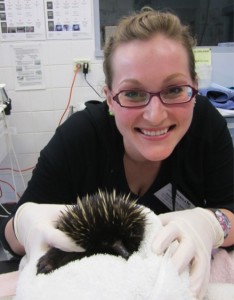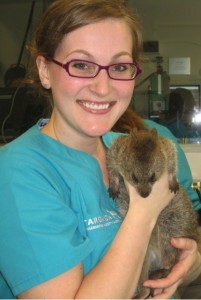Wildlife Veterinary Externship in Australia: Taronga Zoo


Taronga Wildlife Hospital (TWH) is the ideal opportunity for students with a travel bug who love working with wildlife. This is a unique facility in that both captive zoo animals and local wildlife are treated here.
The hospital treats all the animals in the zoo’s collection, which are species from all over the world, as well as injured wildlife from the area brought in by the public. The hospital is located on Sydney Harbour in Australia on the grounds of the Taronga Zoo, so animals that reside here have arguably the best view in the city!

Important Details About Applying
The application for the externship in zoo and wildlife medicine consists of a resume, letter of interest, and completed application form. Placements are 4 weeks long, and they fill up almost two years in advance, so apply EARLY!
Externs must provide their own housing and transportation, but the staff at the hospital can provide you with a list of contacts to help you find housing. The staff is wonderful about responding to emails, making the whole process of organizing an externship overseas much less stressful.
I actually found a wonderful family to stay with through a distant connection (former coworker of my best friend’s uncle), so use every connection you’ve got. I used public transportation to get to and from the hospital, and there are quite reasonable rates for month-long passes. I paid $199 AUD for unlimited travel on all trains, buses, and ferries for 28 days, which was good because my daily commute involved all three!
I also had received a travel grant from the College of Veterinary Medicine at the University of Minnesota to help fund this externship, for which I was very grateful because flights from the States to Australia are not cheap.
Daily Activities During the Externship

I had a great experience at Taronga Wildlife Hospital. All of the veterinary staff members are extremely friendly and laid-back, and I felt very welcome there. There are four veterinarians, one veterinary pathologist, six veterinary nurses, and a few other administrative and laboratory staff members.
Daily duties start at 7:30 am, when the veterinarians meet to go over cases currently under veterinary treatment and make a plan for the day. The morning and early afternoon consists of working with the veterinarians on procedures and examinations of patients. Frequent procedures performed included intake physical examinations for new wildlife patients, radiographs, wound care, and intradermal tuberculosis testing.
Depending on the caseload, students also can participate in necropsies with the pathologist. A skills checklist is provided to give an idea of what you should try to complete in your time there. The workday technically ends at 4:00 pm, but I occasionally finished later when some last-minute cases came into the hospital.
I worked with a large variety of species on this externship and was exposed to some very interesting clinical cases. Within my first week alone, my patients included a short-beaked echidna, a baby Francois langur, a blue-tongued skink, a Brazilian tapir, and a black swan.
The Taronga Zoo has plenty of native Australian wildlife, such as koalas and platypuses, in addition to other popular zoo animals, such as tigers and Asian elephants. The veterinarians are wonderful educators and encouraged me to perform procedures myself, and I was allowed to manage clinical cases on my own under their supervision.
If a student’s university has no specific completion requirements for the externship, students must complete a project while at the hospital. Some days were filled with clinical cases until 4 pm, but most days, there was plenty of time in the afternoons to work on personal research.
I felt like this externship had the perfect caseload – in one day, I could work with a green turtle, little penguin, quokka, and Himalayan tahr. My primary interest is in wildlife health, not zoo medicine, but this was a great overview of zoological medicine thrown in to complement a very decent wildlife caseload!
Elliott here again: Thank you Briana for sharing yet another of your unique externship experiences with us! If you missed Briana’s previous articles, head on over to read about her experiences at the White Oak Conservation Center and with the PAWS Wildlife Center.
You’ve probably noticed from these articles that zoo and wildlife externships tend to fill up early. This means that you should really be starting to plan and apply for the experiences during your first and second years of veterinary school. There’s never any harm in sending an exploratory e-mail to check on the status of an organization’s training schedule. They’ll be happy to let you know if and when they have any blocks available.
This is also the type of experience that I always recommend practicing vets look into. I know there are a lot of us who are done with school but who would still be interested in going back for some further training in these uncommon areas, even if they are unpaid. I think most organizations will at least give you a chance to explain why you’re interested, and most will be more than happy to accept your help, just like they do from vet students.
Doesn’t a month in Sydney at the Taronga Wildlife Hospital sound like fun? Any unique ideas on how to pay for that $2000 plane ticket? Read about my own experiences as a vet student working with a wildlife vet in Australia, and learn how I paid for it by attending a conference at the same time.
Do you have an interesting training or educational experience that you would like to share with the community here? Please leave a comment below or get in touch on my contact page. I would love to help share your story!
[google-map-v3 width=”350″ height=”350″ zoom=”4″ maptype=”roadmap” mapalign=”center” directionhint=”false” language=”default” poweredby=”false” maptypecontrol=”true” pancontrol=”true” zoomcontrol=”true” scalecontrol=”true” streetviewcontrol=”true” scrollwheelcontrol=”false” draggable=”true” tiltfourtyfive=”false” addmarkermashupbubble=”false” addmarkermashupbubble=”false” addmarkerlist=”Sydney, Australia{}zoo.png{}#http://www.elliottgarber.com/wildlife-externship-australia-taronga-zoo/” bubbleautopan=”true” showbike=”false” showtraffic=”false” showpanoramio=”false”]

Comments
Does the externship involve only undergraduate students? Or graduates can also apply?
Grad students can definitely apply! They are especially targeting final year veterinary students. For Australia and the UK, that means fifth year of undergrad. For the U.S. and many other parts of the world, that would be fourth year of vet school.
Ok elliot. Thanks i have qualified two years ago and since then i am in private practice. In 2012 i had training in the Avian and Exotic department in Utrecht Netherlands. I am know also working for a Masters in Conservation Medicine. I meant if vets can apply also.
Thanks a lot again !!
Whoops, sorry about that!
I’m not sure if they would accept graduated veterinarians or not, but I assume they would. In my experience, most externship opportunities like this will also accept veterinarians along with students.
The informational materials might only talk about the opportunities for students, but if you just call or e-mail the administrators for individual programs they are often more flexible. As long as you are willing to do the same type of “student” work for free and otherwise accept that you will be treated like a student I’m sure it would not be a problem. Good luck!
Hello:
I am a portuguese vet, currently both studing as a PhD graduate in Lisbon’s veterinary School, and working as a horse and small animal vet and i also have a part time job in a small private zoo. They have plans to enlarge this zoo and i am getting a bit more responsibility. I did already internships in LIsbon and Rio de Janeiro Zoo, and last year i went to south africa as a volunteer in a wild animal game reserve and stayed with the vet there for a three weeks learning. This time i really want to learn in a wild animal specialized hospital such as yours. Is there any possibility to apply as an extern eventhough i am a graduate vet already and with experience?
Hope to ear from you soon
Best regards
Hello,
I am a US veterinary technology student and am interested in doing an externship during the month of June 2015. I would love to learn more about exotics and Australian wildlife. I will graduate as a veterinary technician in May 2015 and I feel that I could learn a lot from your practice! Please let me know if you are willing to accept technicians.
Thanks
Ashley Swim
Hey Ashley, unfortunately I am not currently working on wildlife in Australia either! If you contact any of these opportunities directly they should be able to help you. Good luck!
Hello Elliott!
I’m a 3rd year vet student from brazil, and I’m looking for externships like this one, but do you think they’ll see as a problem that English is not my first language?
I’ve lived a year as a exchange student in the US, I have fluent English, but may not know some technical terms…
Thank you!
Hello, how could I get in contact to ask for information about doing my professional practices? Is there a phone number i could call to or an email? Thank you very much.